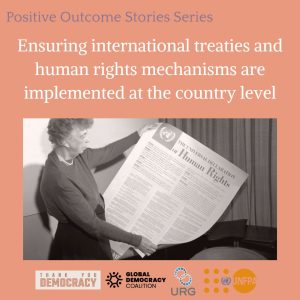Universal Rights Group & UNFPA Positive Outcome Story: Ensuring international treaties and human rights mechanisms are implemented at the country level

Today, international agreements/treaties are often signed by many key States but significant challenges remain, in terms effectively implementing them domestically on the ground.
Universal Rights Group, together with UNFPA, conducted a report, entitled “Advancing rights, transforming lives,” which looks at five country case studies and assesses the degree to which recipient States have been able to take deliberate and relevant steps to implement such international agreements/treaties as well as SRHR recommendations, with UNFPA and United Nations Country Team support. It also assesses the degree to which UNFPA and the United Nations Country Teams have been able to feed information and policy advice into State review–implementation–reporting cycles to influence and inform subsequent recommendations.
Strategic engagement with State actors and check mechanisms have resulted in deepening the legal and medical condition of mistreatment or discrimination during childbirth in Costa Rica; shifted the societal perception about harmful social norms and strengthened culturally-sensitive approaches by the State to eliminate social traditions like female genital mutilation in Côte d’Ivoire; strengthened State intervention in terms of human rights mechanisms on gender-based violence. This implies that the work of both organizations have a significant impact on the political institutions of different countries as well as their human rights mechanisms.
